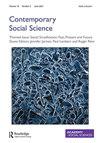全球南方的社会保护和粮食安全关系:来自西非的经验证据
IF 3.9
Q1 SOCIAL SCIENCES, INTERDISCIPLINARY
引用次数: 9
摘要
社会保护有助于解决极端贫困问题,加强粮食安全,同时增强抵御冲击的韧性。在全球范围内,在过去二十年中,社会保护帮助约1.5亿家庭摆脱了极端贫困和粮食不安全。然而,只有大约45%的世界人口得到至少一项社会援助。本研究以西非为例,实证考察了社会保护对全球南方国家粮食安全的影响。数据来源于2005-2018年期间的《世界发展指标》和《国家政策机构评估》。数据涵盖15个西非国家,这些国家都是西非国家经济共同体的成员。为了解决可能的内生性问题和反向因果关系,本研究采用广义矩法(GMMs)。结果表明,社会保护在统计上显著,对西非的粮食安全具有积极影响。这意味着,社会保护覆盖面每增加1%,粮食安全水平就会提高2.1%。因此,研究建议应加强社会保护干预,以减轻贫困和最弱势家庭所面临的社会经济冲击的影响。本文章由计算机程序翻译,如有差异,请以英文原文为准。
Social protection and food security nexus in the Global South: empirical evidence from West Africa
ABSTRACT Social protection helps in addressing the problem of extreme poverty and enhance food security, while building resilience against shocks. Globally, within the last two decades, social protection has helped in transferring about 150 million households out of extreme poverty and food insecurity. However, only about 45% of the world population is covered by at least one social assistance. This study empirically examines the effect of social protection on food security in the Global South, using West Africa as a case study. Data were sourced from the World Development Indicators and the Country Policy Institutional Assessment for the period 2005–2018. Data cover 15 West African countries that are members of the Economic Community of West African States. To resolve the possible issue of endogeneity, and reverse causality, the study applies the generalised method of moments (GMMs). Result showed that social protection is statistically significant and has a positive effect on food security in West Africa. This implies that a 1% increase in social protection coverage may increase the level of food security by 2.1%. Therefore, the study recommends that social protection intervention should be enhanced to mitigate the impact of socioeconomics shocks faced by the poor and the most vulnerable households.
求助全文
通过发布文献求助,成功后即可免费获取论文全文。
去求助
来源期刊

Contemporary Social Science
SOCIAL SCIENCES, INTERDISCIPLINARY-
CiteScore
6.40
自引率
8.30%
发文量
15
 求助内容:
求助内容: 应助结果提醒方式:
应助结果提醒方式:


